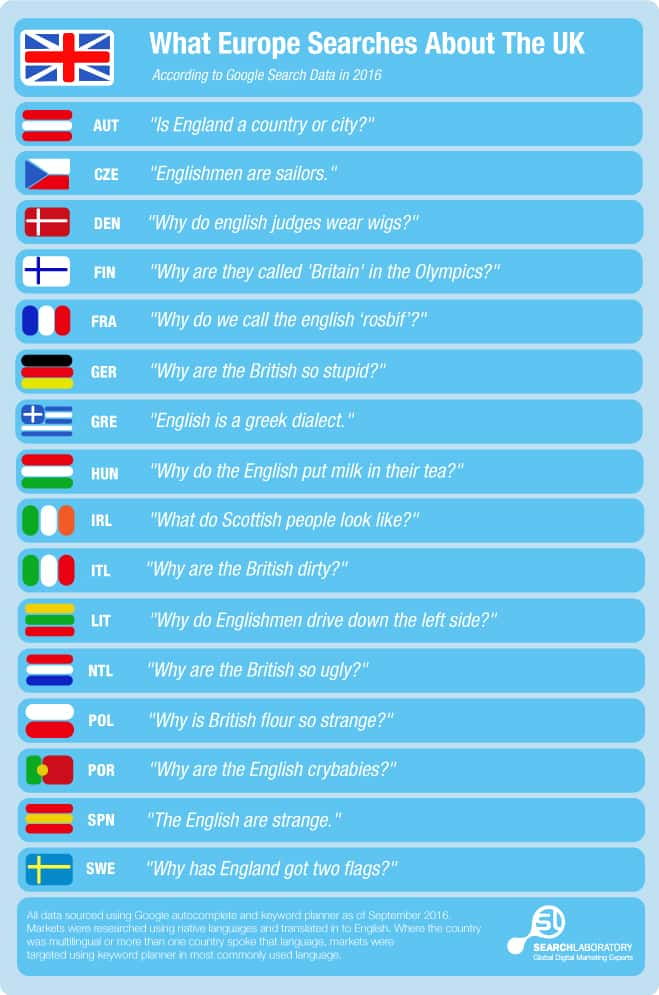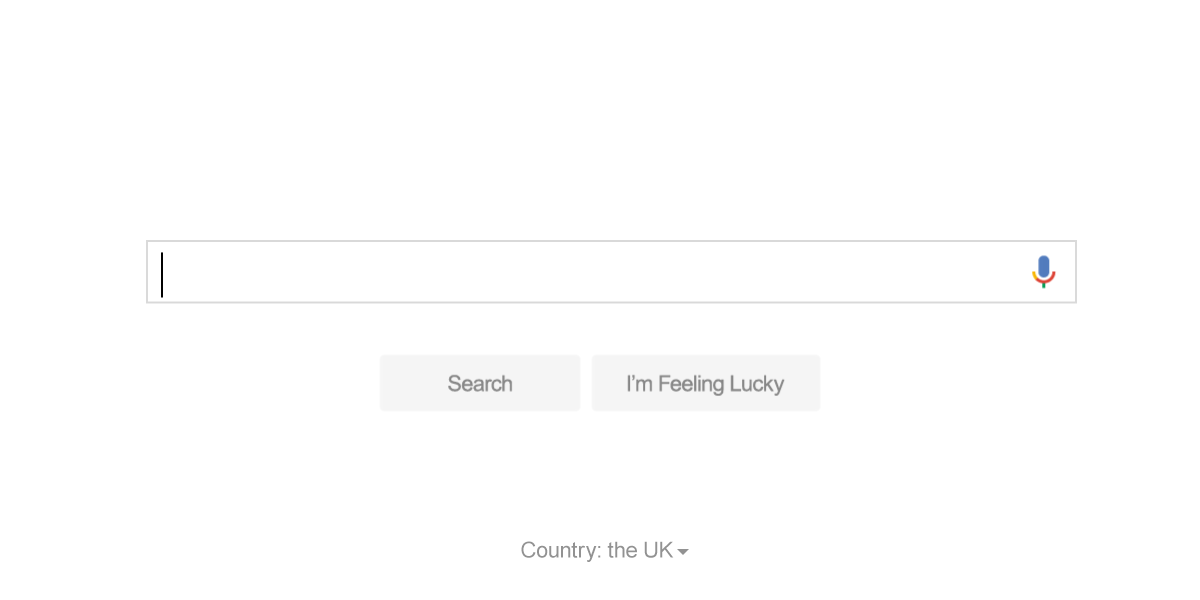We’re all curious to find out what others think about us. Whether it’s family, friends or neighbours, we’d all love to be a fly on the wall and find out what people really think about us. Well, luckily, thanks to search engines we are able to get at least some insight into what questions and queries people around Europe ask.
The biggest search story of the year in the UK has undoubtedly been Brexit. Users from all over the continent have been searching queries in the hundreds of thousands every month since February, regarding Britain’s now impending exit from the European Union.
The term itself, it’s believed, was coined in 2012 by British Influence founder Peter Wilding, so has been in common parlance for quite a while. Search numbers peaked in June (the month of the referendum) with 12,472,560 searches. In the months after, though, there is still a ton of interest. In fact, in July, the term still got an astounding 1,290,250 searches.
So, there’s still a lot of appetite to learn about what Brexit means for Britain, Europe and the people who live here, but what else do Europeans want to know?
Our International SEO team used Google’s autocomplete feature to find out what some of the EU’s biggest countries were commenting, querying and questioning about the UK:

France, Germany and The Netherlands
France: “Why do we call the English rosbif?”
The name ‘Rosbif’ dates back to around 1850. Perhaps unsurprisingly, it simply refers to the rather tame British cooking tradition of the roast joint of beef with vegetables.
Known for their culinary skills, the French have been using this term ever since to poke fun at their neighbours across the channel. It is technically an insult, but we can’t see many British people getting up in arms about it. Who doesn’t love a good roast?
Germany: “Why are the British so stupid?”
This is a funny one. While IQ levels across Western Europe are generally around the same level, Finland, Poland, Germany, and Austria all rank above the UK when it comes to school standards; we hate to admit it, but there might be something to this one.
However, this may have something to do with the fact that 21 other countries in the EU spend more money on education proportionally than the UK, including all of the countries listed above.
The Netherlands: “Why are the British so ugly?”
Now hey, we all have a personal taste but let’s get an outsider’s perspective on this. According to an American survey by MissTravel.com, Australians and Italians are the only nationalities whose men are ‘sexier’ than the English, and only Brazil, Russia, Colombia were rated better than British women overall. Dutch women did make it to number 10 though, so we’re not far off each other!
Italy and Portugal

Italy: “Why are the British dirty?”
There’s a surprising amount of information online about how often people around the world shower. According to Euromonitor’s study into global bathing habits, the UK is on the lower end of the spectrum when it comes to showers per week.
The trend does appear to follow that the warmer the climate, the more often people shower. So, for instance, Brazilians, who live in notoriously humid weather, can shower up to 12 times a week! Who needs 12 showers with the Great British weather giving us a shower every other day?
Portugal: “Why are the English crybabies?”
We always thought the British stereotype of the stiff upper lip was alive and well, so we were intrigued by this one. We can’t help but feel this comment might have something to do with a certain football match involving Wayne Rooney and then Manchester United teammate Cristiano Ronaldo.
While we might be bad losers, we wanted to find out who was really more emotional. We took a look at the global emotional awareness ratings of every country around the world and although it was close, the Portuguese are actually rated as ‘more emotional’ than the United Kingdom.
Denmark, Sweden, and Finland

Denmark: “Why do English judges wear wigs?”
There are a few different explanations as to why those distinctive white wigs came to be used in court. It seems to hark back to a tradition of mirroring British court dress, which involved theatrical dress such as wigs, although there are other explanations, too.
Some historians have found evidence that they were used to ensure that judges had anonymity, as well as impartiality: the uniform white wig meant they could not be attributed to any group of peoples based on hair colour and therefore accused of bias.
Sweden: “Why has England got two flags?”
Well, first of all, let’s be clear, England has only one flag – the St. George’s cross. However, if these Swedish searchers are referring to the Union Jack, then they might like to know that that flag actually relates to the whole of Britain, incorporating England, Scotland, Wales, and Northern Ireland.
While each of the countries has their own flag, they are all ruled by one central government and the union flag is a representation of that union.
Finland: “Why are they called ‘Britain’ in the Olympics?”
While ‘the UK’, or ‘the United Kingdom’, is the generally accepted term to describe the country, ‘Great Britain’ is also still used.
Although this technically only refers to England, Scotland, and Wales on the mainland, the British Olympic committee issued a statement saying they would be retaining the name Team GB (which is actually short for ‘Great Britain and Northern Ireland Olympic Team’) so that they weren’t excluding any overseas territories that might have been excluded by using the term ‘Team UK’.
Hungary and Poland

Hungary: “Why do the English put milk in their tea?”
Because it tastes better? Well, perhaps, but there are also some other theories.
The most obvious explanation is that it’s simply to dilute the flavour of strong tea strains. However, there are also theories that it was used in the past to both cool tea down so it didn’t crack china tea cups, and also as an indication of social standing: the milkier the tea, the poorer you were: milk was more readily available than tea in the 18th century.
Poland: “Why is British flour so strange?”
This one took us a bit by surprise. But, according to a very in-depth discussion on Migrant Rights Network, British flour – and, as a result, British bread – is indeed very different from Polish varieties.
This may go some way to explaining the popularity of Polish and Eastern European supermarkets in recent years, as Polish expats seek some home comforts in the form of rye bread and cured meats.
And what questions are we searching for?
France and Italy: “What do French men like” and “Italian men in bed”
To get a glimpse of the other side of the coin, we also investigated what UK residents searched about their European neighbours. It appears that many British people are particularly interested in mainland Europeans in a romantic sense: “what do French men like?” was one common search term.
Italians, it seems, are also in high demand – some curiosity about their prowess emerged, with the search term “Italian men in bed” popping up. While we might not be able to answer this philosophical question about the desires of French men, according to a Daily Mail survey from 2014, it is indeed Italian men who British women are most interested in. That explains the searches, then!

Germany: “The German stare”
We also discovered the phenomenon of the “German stare”. A quick Google search explained the perceived intense stare employed by many Germans, noted by many travellers when visiting the country.
It’s such an accepted trait that it was reported on by the major German newspaper Der Spiegel, and was also the focus of a piece of art by Dresden-based sculptor Stefanie Bühler called Die Nachbarin (The Neighbor), depicting an old German woman’s intense and endless stare from a window. The curtain twitching, snooping habit may be something the UK has in common with the Germans.
Spain: “The Spanish lisp” and “Sephardic Jews Spanish citizenship”
Brits also seem perplexed by some Spanish language customs, simply searching “Spanish lisp”, presumably curious about that particular Spanish phonetic device. Just in case you wondered, it has nothing to do with Spaniards imitating one-time King Pedro and is now considered to be a somewhat ‘country bumpkin’ language trait.
Another interesting one from Spain was the recurrence of “Sephardic Jews Spanish citizenship” and other related terms, referring to a decision made by the Spanish Government last year which offered Spanish citizenship to anyone with Sephardic Jewish heritage.
This is in response to the denomination’s expulsion from the country, wait for it, 500 years ago. So, if you don’t have Irish heritage, you might want to check to see if somewhere down the line you can trace your family back to 15th-century Spain to get yourself an EU passport. Now there’s a #brexitloophole.
We hope we’ve managed to answer just a few of the many questions people across Europe have been searching for. Got any more questions about the UK? Let us know on Twitter, @searchlabs, and we’ll see what we can do to help!


